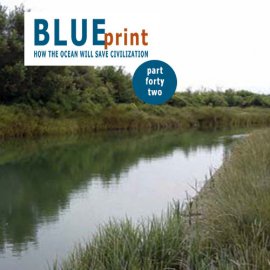Third Nature
-
English
-
ListenPause
[intro music]
Welcome to World Ocean Radio…
I’m Peter Neill, Director of the World Ocean Observatory.
Imagine First Nature, the planet at its origin, a swirling mix of forces that resolve into land and sea, a planet uninhabited, a wildness of fluid change and evolutionary being that exists for millennia, irrelevant units of time, itself a construct not yet defined, known, measured. We speak of earth as a blue marble, a colored clarity with tints or flecks of color that extrude from the core as bits of volcano mounts, as glacial mass emerging, drifting, shifting, to form something mass-like called land, even if there was then no one to see or name it. This is First Nature, the foundation for all that follows, that as animals and humans evolved, transitioned from a space to a place, and to an environment that through adaptation and invention becomes a home for first peoples with all their constructs of language, organization, architecture, experiential knowledge, spiritual ideas, wisdom, and generations. A foundation for civilization derived from this First Nature, this beginning.
Second Nature followed: defined as “a characteristic or habit in someone that appears to be instinctive because that person has behaved in a particular way so often.” We built our institutions by repetition, emulation, imagination, creativity, energy, and some innate quality of joined humanity that, despite the endless conflicts and destruction, survived by extracting over and over again the resources provide by First Nature, and turning it into substance by which we survived. When we are born, we know nothing of this, only to be taught by myth, some knowledge derived from history, some exploration and understanding as layers of experience taught from generation to generation. This was a landside thing, while the ocean still troubled beyond the shore as an unknown, dangerous place. We built industry, in degrees made necessary by our degree of growth, a population that survived from the fruits of the land, grown and extracted, in ever-increasing circles of demand and supply to a point where today we are faced with the implication of exhaustion as expressed by the consequence of everything that has come before.
We have behaved in a particular way so often. So often that we have consumed the particulars and are at risk and the old behaviors have no traction, and no meaning. We are so used to health and wealth that we ignore those who don’t have it, we fight over things, often unnecessary, while we are indifferent, or afraid, of the change demanded by our Second Nature.
What will be our Third Nature? Those of apocalyptic view might argue that we will regress back to the chaos of that first wildness, to dystopian disintegration that reduces us to uncivilized, anti-social conflict that will ultimately destroy even the fittest. Others retain faith that those early constructs and the values inherent will show us a way.
What will it look like? It will congregate to water first of all, to communities along rivers and lakes where we can work successfully to provide, to govern regionally along watersheds, to coasts, and to exchange of necessary goods and services from across the sea. The ocean, then, will be the new land; it will be the source of water, desalinated, to irrigate our bodies and our fields; it will be the energy from released heat, wind, and wave that will support our utilities shared as equitable value derived; it will be the source of food, medicine, and community and cultural connection. The ocean will provide solace and survival because we will know that this Third Nature will only endure as long as we can sustain it, and if that too is fought over and fouled, then we will have lost the opportunity of life and will have no one to blame, no one even to notice that, amidst the resuming chaos, we once were there.
What will it take? I have asked this question for years. What will it take for us to assume and achieve the best of who we are, to abandon the old paradigm and welcome the new, to live up to, indeed to exceed our highest expectations, by applying our energy and imagination to solutions, not prolongations, but the radical change demanded of the evidence of today? What will it take to define Third Nature and to return to the ocean to make it so?
We will discuss these issues, and more, in future editions of World Ocean Radio.
[outro music]
Since the origins of planet earth, through the foundation of civilization, to the exhausted land we live in today, we are faced with a Third Nature. If we can abandon the old paradigms, we can make the shift toward water--our watersheds, rivers, lakes and primarily coasts and ocean--the places we will turn for our energy, our fresh water, our food and all of the things that contribute to our sustainability and survival. This week marks week 42 of the BLUEprint Series: How the Ocean Will Save Civilization, outlining a new and sustainable path forward, with the ocean leading the way.

About World Ocean Radio
Since 2009, a weekly 5-minute podcast covering a broad spectrum of ocean issues from science and education to advocacy and exemplary projects. World Ocean Radio, a project of the World Ocean Observatory, is available for syndicated use at no cost by college and community radio stations worldwide. Contact director@thew2o.net if you are interested in becoming an affiliate or know of a radio station that should be broadcasting these episodes each week.
Image
Salt River Delta, Eel River Estuary
Riverside, California
Wikimedia Commons public domain
- Login to post comments



